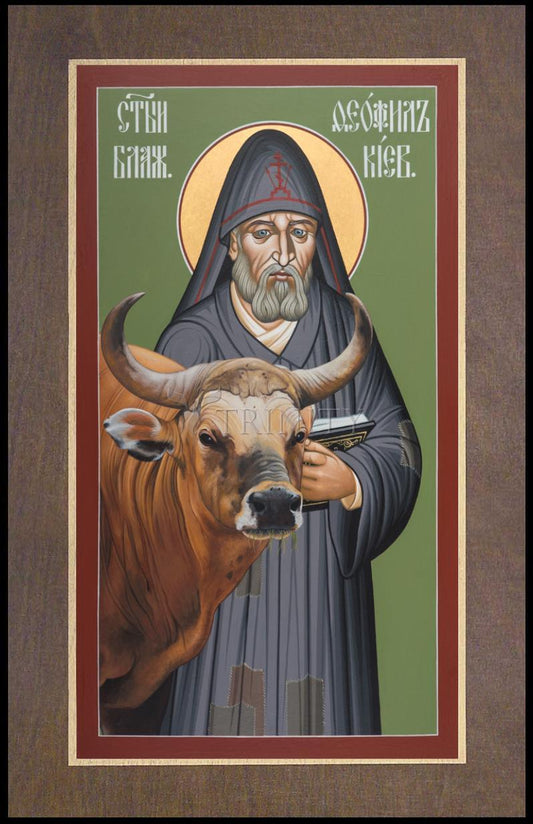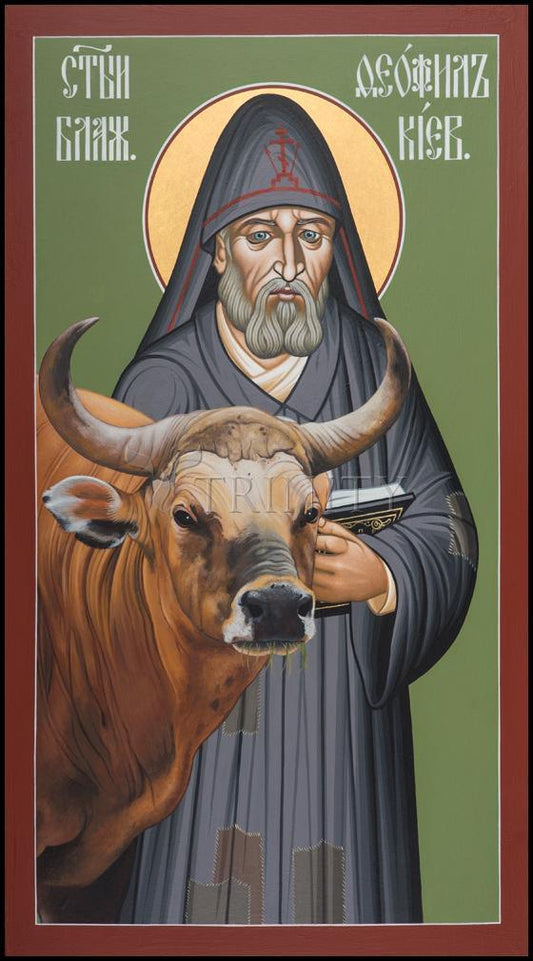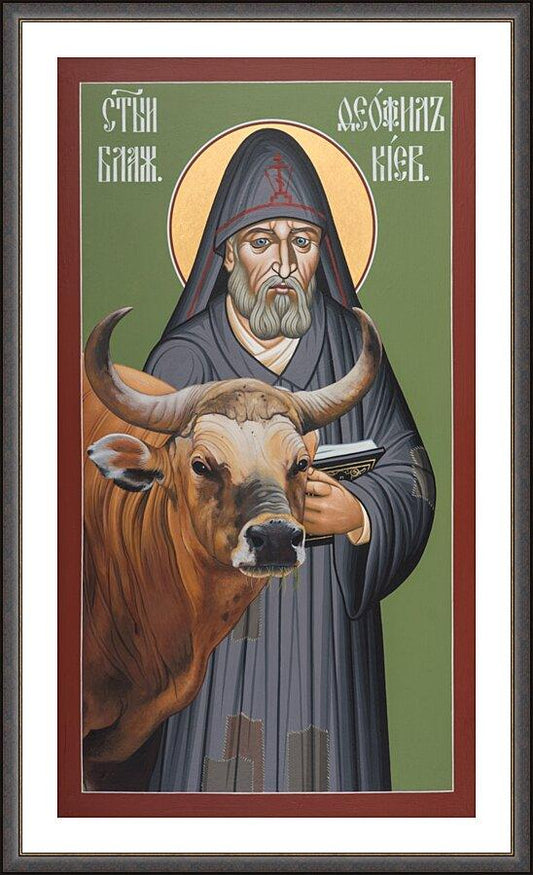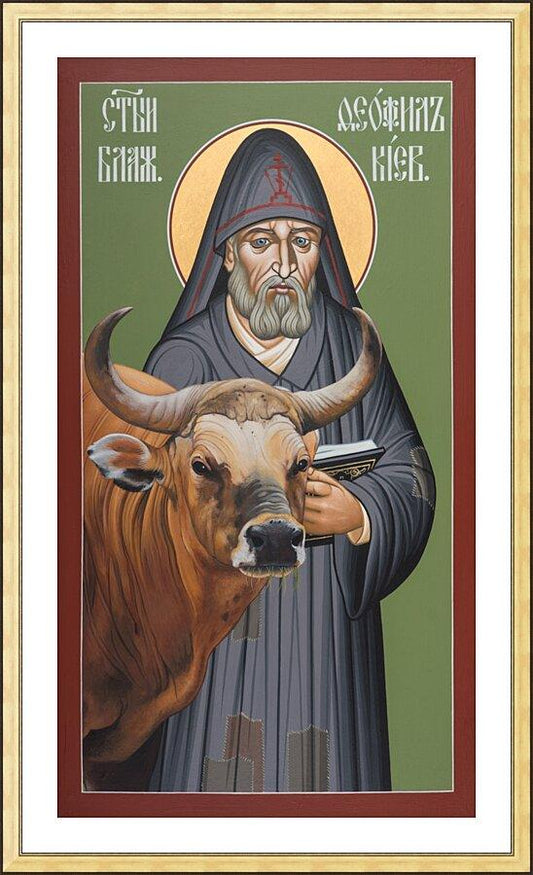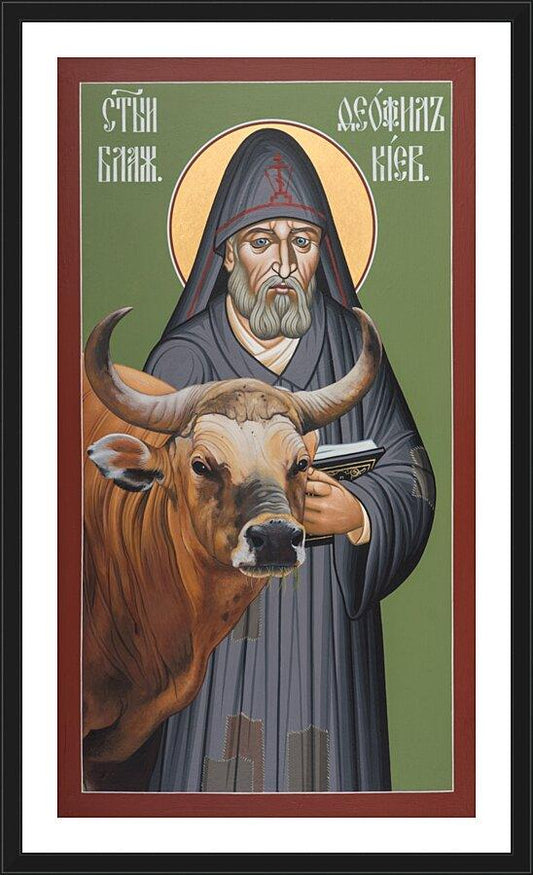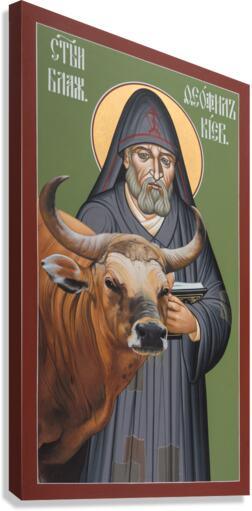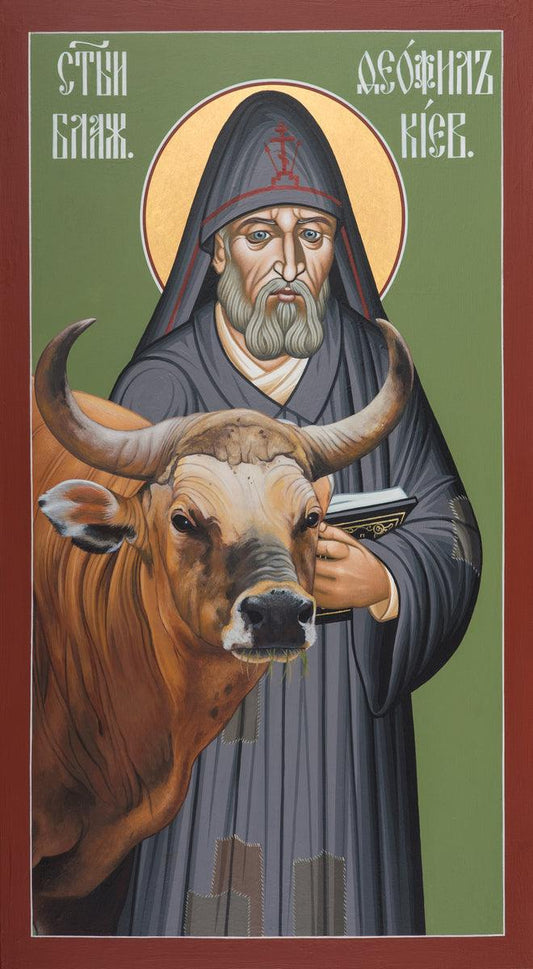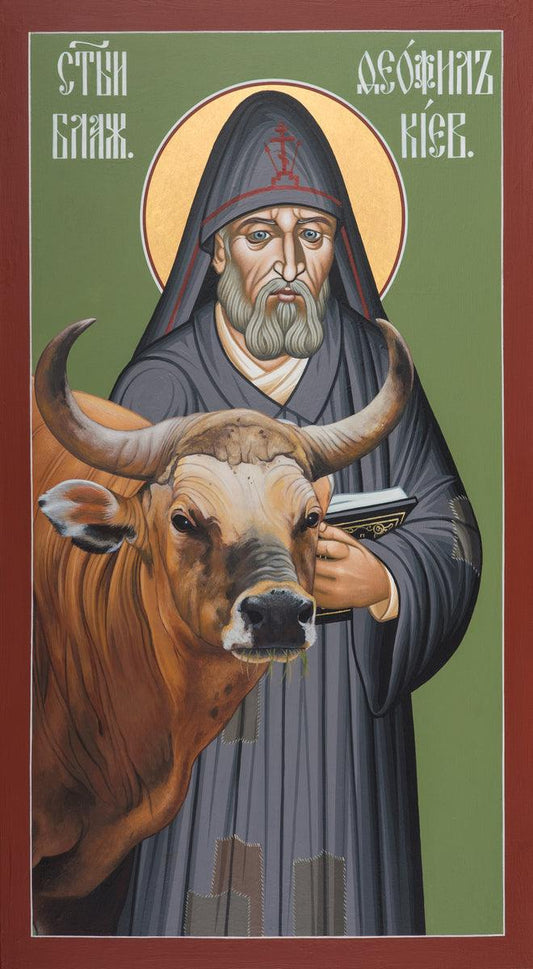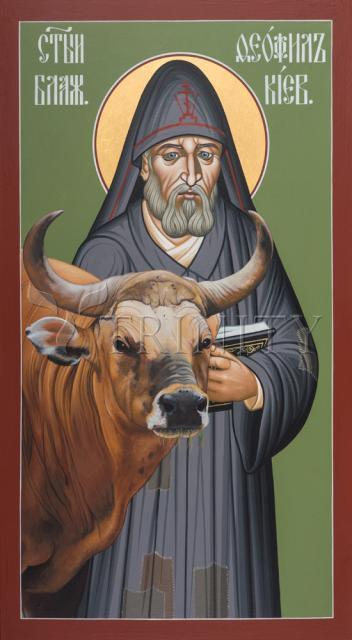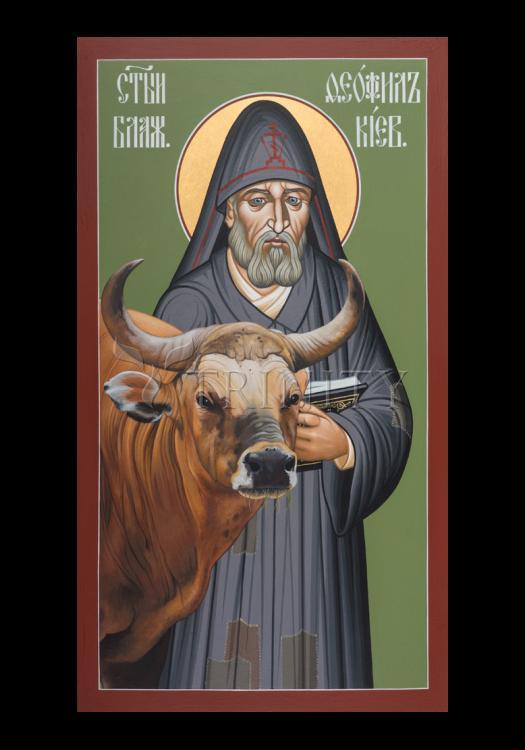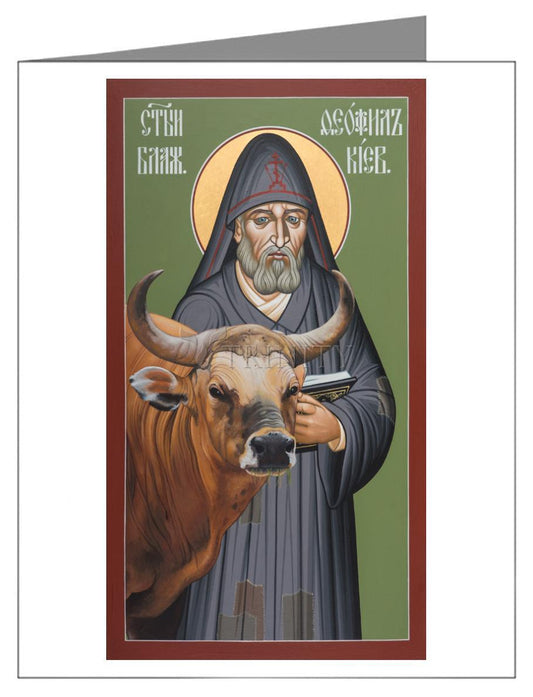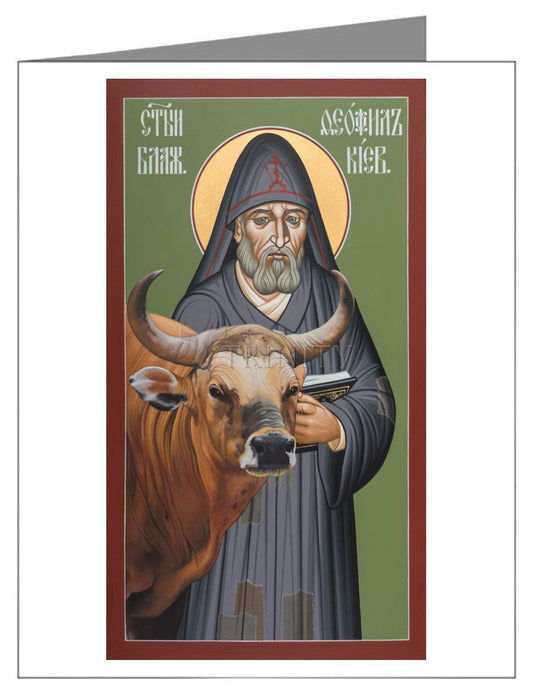In the year 1788, in the small town of Makhnovo, in the district of Kiev, twin sons were born to an Orthodox priest, Andrei Gorenkovsky, and his wife, Evfrosiniya. Both boys were strong and beautiful at their baptism, but the eldest son, named Foma, refused from birth to be breast-fed, much to the consternation of his mother. To save his life, she resorted to feeding him potato water, soft-boiled turnips and carrots. This rejection did not settle calmly in her heart, however, and fueled by taunts from superstitious women of the neighborhood, the mother began to believe Foma a changeling, substituted at birth by a witch.
After six months Evfrosiniya secretly ordered her maidservant to throw the child into the river. The servant pleaded on behalf of Foma but fearful of her mistress' threats, she complied. She took the baby to the Dnieper at the first light of day and dropped him into the water. Miraculously he floated peacefully to the opposite shore. Terrified, the servant crossed over, gathered the infant into her arms and again dropped him into the river. This time Foma was carried by waves upstream and gently cast upon a small island. Shaken at this undeniable miracle, the servant brought Foma back to his mother, weeping that she would rather lose her life than drown the innocent child.
The embittered mother then seized the child and set out for the river. On the way she passed a water mill and threw her son under the great wheel. Assuming him to be dead, she left. Then another miracle occurred. The millstones had stopped and the miller ran outside to see what had happened. He found the wheels restrained by an unseen force and looking down saw baby Foma floating in the whirlpool. He lowered himself down and grabbed the child, and as soon as he did, the wheels began to move again.
The servant watched all this from a distance and came forward to tell the miller of the three miracles she had seen. She pleaded with him to save the child. Foma's father, it seems, was unaware of all that had occurred, so they related everything to him. He pleaded with his wife but she was adamant that she would kill the child, so he took the boy away and had him secretly raised by a nursemaid. But soon the father passed away and left Foma without a guardian, so the miller once again took him into his care. The next several years, until Foma was seven, were spent in home after home as each of his guardians passed away. Then a village elder, feeling that the mother's heart must have softened, took the boy to her. No sooner did they reach the place where she was chopping firewood, than she threw the ax at her son where it cut deep into his shoulder. Horrified, the elder bandaged Foma's wound and took him away.
Soon it was discovered that the boy had an uncle, a priest at the Bratsky Monastery in Kiev. The kindly man took Foma to him and related all that he knew of his unusual life. In Bratsky Monastery Foma found refuge. He was assigned to the academy and spent long hours in prayer and the study of theological books. Eventually Foma'sinnocent prayers were heard by God and his mother's heart was softened. She suffered by that time from a dreadful ailment that tortured her day and night, and eventually repented of her evil ways. At the same time young Foma prayed and wept over her pitiable condition. Before her passing, mother and son were finally reunited and she asked his forgiveness.
Foma was an excellent student but he had no interest in higher studies. He tried earning a livelihood as a reader, then a sacristan, but felt oppressed by the world and in 1812, at the age of 24, he entered the Kiev Bratsky Monastery as a novice. He joyfully embraced the peace and sanctity of cloister life. Years passed and no one bothered him; to everyone he seemed a model of humility, chastity and obedience. In 1821 he received tonsure and was renamed Feodorit. Within a year's time he was elevated to the stature of hierodeacon, a position that only made him increase his podvigs or austerities, striving with all his strength to imitate those saintly ones who have pleased God.
In 1827 Feodorit was ordained hieromonk and appointed the steward of the monastery, an honor desired by many. But the position, which required meeting people, did not suit his calling and he begged to be released from it. He asked instead to be allowed to retire to the nearby monastery caves. When Feodorit's request was refused, his life took a crucial turn. He chose to adopt the great penance of living as a "fool-for-Christ's-sake." From that day forward he feigned eccentricity as a means to retreat from the world and grow Godward. Thus began his withdrawal from all things of the world; he closed the temple of his soul to any human relationship for as long as he lived. In 1834, at the age of forty-six, he took the monastic habit and was renamed Feofil.
Feofil was tall and thin from constant fasting. His complexion was light, his hair fair, and his eyes bright blue. He walked with lowered eyes and often would stand motionless outside the closed doors of the church until the service ended, then depart. He never missed a single service. Inside the church, however, when he was assisting in the mass, he behaved like an eccentric, facing the opposite direction of the other priests, or walking in the wrong direction, all of which angered the clerics.
He always spoke in a rapid monotone, using the Little-Russian dialect, and carried everywhere he went a small prayer book and a basket, bowl or jug filled with provisions for the needy. On the day of his tonsure he sewed pieces of old rags around his cowl and wore it that way until he died. Although he was constantly sought out by the common folk, his peculiar ways did not endear him to the other monks or his superiors who could not see his irreproachable purity and childlike innocence. Before them he deliberately hid the inner light of his illumined soul.
Feofil remained austere his entire life and kept nothing personal in his cell except a few icons which he worshipped. The modest income received as a monk he used as a means of charity for the many to whom he ministered. He would remain without food for two or three days at a time while giving his share of food and money to the poor, wanderers and beggars. On Wednesdays and Fridays he had only a little honey mixed with water and ice. During Lent this was all that he ate for the first week. He boiled mint leaves for tea and would save half from each cup he drank to give his visitors.
An extraordinary visionary, he could see into every soul as clearly as we see into pure water. People from all walks of life came to him endlessly for blessings and guidance; they followed him wherever he went in hope of hearing a single word from his lips. The meaning of what he spoke was often difficult to comprehend but his words invariably proved to be true. Once a peasant who had heard how Feofil could foretell the future asked him how he did it. The Starets, as he was called, suggested that he pull out an eyelash and tie it into two knots. When the peasant found this impossible, Feofil replied, "That is how difficult it was for me to attain my present condition."
The Starets' method of blessing was unique and peculiar: instead of hearing the supplicant's confession, he would hold his hand over the person's head and enumerate his or her sins, at which point the person would frequently break down in tears of repentance. Feofil had many spiritual children who loved and depended upon him and whom he would visit daily, giving comfort and strengthening them with prayer.
It is said that the saint's power of prayer on behalf of those suffering was unusual and that many were healed by his intercessions. With one woman who had convulsions, he read the Gospel over her and then firmly hit her on the head with it. As she fell backward, he pronounced loudly, "In the name of our Lord, Jesus Christ, I command you to leave!" Then he advised her to live at the Hermitage and not venture from there, which she did until the day she died.
A young man of the area was obsessed with passions of the flesh. One day he nearly ran into the Starets and fled so that his affliction would not be exposed. He was stopped by Feofil's words: "Where are you going? Come here to me. We will delight in lascivious thoughts together." The young man wept sorrowfully before the Blessed One who knelt in prayer with him. After half an hour the Starets told him, "Lascivious thoughts will no longer disturb you," and immediately the youth was relieved of such thoughts.
A merchant gifted Feofil a horse which he would hitch to a little wagon for his daily ministrations. He never sat in the front of the cart but in the rear, with his back to the animal, reading his psalter and praying as they moved along. The animal walked unguided and always knew where the Starets needed to go. When Feofil visited the city the merchants would run outside as soon as they heard of his arrival, for everyone knew that on the day they gave to Feofil, their business increased many fold. All that was deposited into Feofil's cart he distributed to the poor and needy. Later he had a bullock cart that he used in the same way.
His days he would spend in the woods in prayer; on one particular stump he would kneel and pray for whole days, bewailing the corruption of his time and asking forgiveness for the sins of the world. He paid no attention to outer appearance or cleanliness, only the beauty of the soul. His clothes were tattered, his feet covered with torn slippers or a worn out leather boot on one and a felt boot on another. To expose gluttony among the monastics, he once tied a pillow to his stomach and walked around the monastery grounds. The academy students understood his prank right away and responded with peals of laughter. It was noticed, however, that the more slovenly he dressed, the more his soul soared toward God.
Feofil's cell was constantly unkempt and littered with rubbish. When asked why he lived in such filth, he responded, "So that everything surrounding me will constantly remind me of the disorder of my soul." Others who visited his cell reported that it was full of pots and crocks of provisions: grains, tea, oil, flour, sugar, bread, tarts, honey, fish, fruit, candles, etc. He maintained none of this for himself, yet it aroused envy in some of the monks. They would plot to have Feofil's cell moved and then, in the guise of helping with the "furniture," steal everything he had saved up. The blessed one would take this in stride. "Wondrous are Thy works, O Lord," Feofil was fond of saying, whatever the circumstances.
He always prayed in secret, lighting three candles in memory of the three times he had been saved from the water. He spun wool, knitted socks and wove sackcloth, which he gave away to the needy. He prostrated countless times each day to the icons and took little rest, and that on a bench against the wall or on a narrow log so that in sleep he would fall off and get up to continue his prayers. In spite of this, whenever Feofil was visited by the Abbot"”or Metropolitan as he was called"”the Starets would know in advance and pretend to be asleep. The superior himself was a saintly man but Feofil hid well from him the state of grace in which he lived.
Because of his large and pure heart, Feofil had power over animals, whom he dearly loved. At one time he kept bee hives in an orchard and looked after his bees with fatherly affection. An empty field near the hermitage he arranged to be seeded with hemp for the birds to feast upon. The bullock that pulled his little cart he had acquired by an unusual circumstance. The unmanageable beast had already crippled several people and was about to be butchered. The Starets asked the butcher to give it to him "We will teach him humility." Feofil instructed the butcher to walk up to the bullock and whisper in its ear: "You are no longer mine but belong to Father Feofil; prepare to visit him." After that, it is said, the bullock became as docile as a lamb and even licked the butcher's hands in appreciation.
Constant abuses by the monastics and his superiors the Starets bore patiently, even joyfully, in imitation of his beloved Christ. When a cell-mate asked him how he endured it, Feofil told him, "Ah Ivan, it is better to endure injustice than to commit it oneself. It is sinful to give up to sadness. We are all exiles on earth. Exiles do not wonder at insult or injury. We are under God's penance and penance consists of deprivations and difficulties."
An eyewitness related one of his extraordinary healings. A widow who had lived comfortably when her husband was alive, was left penniless, often without bread to eat. She was very devoted to Feofil. One night her daughter fell sick with a fatal illness and was lying unconscious. The woman had no one to help her and it was impossibly far to go to the Father, so she sobbed in anguish at her dying daughter's side. Suddenly she saw a movement outside the window of their hut. Astonished that anyone would come at that hour, she opened the door and there stood Feofil, looking at her with great tenderness. "Peace be with you"¦" he said. "You wanted to see me so I have come." The woman fell at his feet and wept loudly. He told her not to weep, that her daughter was not dying, "only cold." The Starets removed his warm outer cloak, covered the young girl with it and prayed at her side for half an hour, then quietly left. When the troubled mother checked her daughter, she found her awake and already feeling better. Within the hour she was completely well and walking around the room, much to the astonishment of the neighbors.
In old age the Blessed One was moved to a more comfortable monastery by a superior who loved him, but he did not give up his austere ways. The last months of his life he conversed more freely with the people, giving guidance and directions and admonishing them not to forget to pray for "smelly" Feofil. "Do not allow yourselves to be tempted," he told them, "and avoid attaching your hearts to anything earthly"”we will leave all that is here behind us. Good deeds alone will go with us into the other world"¦"
Exactly one month before his demise, the saint stopped eating, satisfied with only a little holy bread dipped in wine diluted with water each day. The sad news of the war, which he saw in visions, tormented him. Once, before a battle that proved particularly calamitous, he wounded his face and body and lay down bleeding beneath the eaves of the monastery shed. When the Abbess asked him why he was doing that, he said it was in penance for those who would lose their lives in battle that night.
In the last week of his life the Starets indicated where his grave would be. Uncharacteristically he placed a bench across the threshold of his cell, and with his head at the entrance, lay down to rest upon it. He told his cell-mate that it was the first time in thirty-eight years he was lying down so peacefully; he was amazed he had not thought of it earlier. Two days before his passing Feofil sent incense and myrrh to the Metropolitan. When asked why, Feofil replied that on Wednesday they would be burying someone, "perhaps even me."
On the day of his passing the Blessed One sent to the marketplace for three rolls of bread, incense and honey. He told his cell-mate and disciple not to leave the cell that day "You will see something extraordinary." The Starets asked that his cell be cleaned thoroughly so that he would be received in a Christian manner. Then he lay down on the bench in the doorway and had the stove lit, the incense and myrrh burnt and the votive lamp lit in front of the icons. He told his disciple to be sure not to let the lamp blow out. Then the saint sent word to the superior that he had passed on and they should ring the bell.
The cell-mate, meanwhile, was kneeling at the head of his beloved Master, kissing his hands and beside himself with grief at the impending separation. As he was listening to the last words of his spiritual father, suddenly something flashed before his eyes and a coolness struck his face. He looked up and saw that the ceiling was no longer there and the blue sky was, as if, extending its arms to receive the body of the dying Starets. "O Lord, into Thy hands I yield my spirit," the saint whispered faintly.
The boy was trembling uncontrollably with fear now and bolted out of the room into the courtyard where he collided with the superior and the other cell-mate who were hurrying there. When they reached the cell everything was as it had been before: the ceiling had descended to its proper place and Feofil was lying motionless on the bench, his arms crossed over his chest, his face in a beatific smile. No sooner had he released his last breath than a heavenly fragrance filled the cell. This was on October 28, 1853. He who had never given any thought to his own body or the vain pleasures of this world had at last ascended to his true Home in God"”in glory!
"”Excerpts from The Miraculous Life of St. Feofil A Fool-For-Christ's-Sake,by Sita Stuhlmiller



